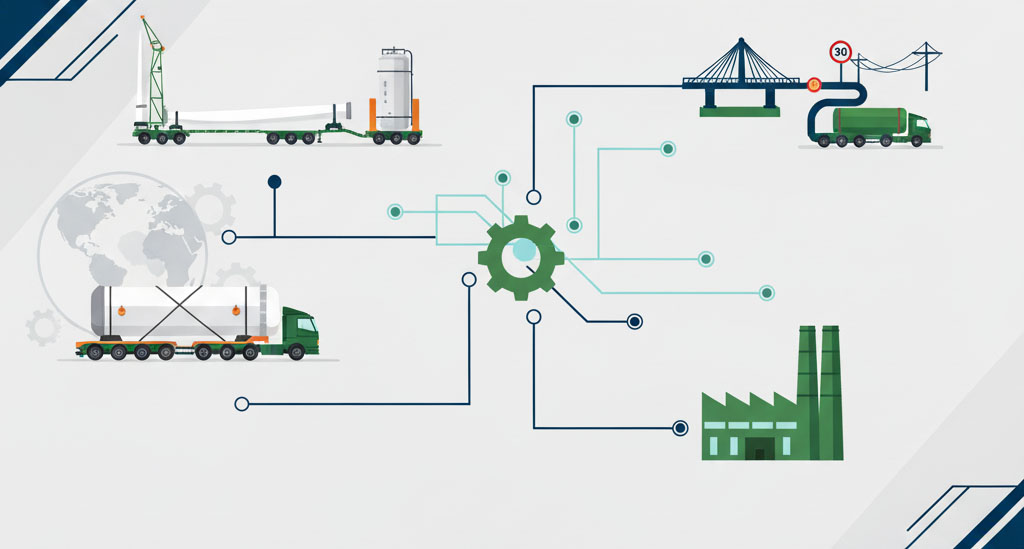
With the increasing demands of globalizing trade and industry today, project cargo transportation is becoming increasingly important. Transporting large and bulky equipment used in sectors such as energy, construction, mining, defense, and infrastructure safely requires serious planning and expertise. This is precisely where project cargo transportation stands out as one of the most critical logistics services in the industry.
What is Project Cargo Transportation?
Project cargo transportation refers to the shipment of large, heavy, and sensitive cargo that cannot be transported using standard containers or traditional logistics methods. Transporting this type of cargo is a complex process requiring specialized equipment and expertise. The size and weight of the cargo to be transported can influence the transportation methods and routes. For example, large cargo such as wind turbines, oil refinery equipment, power plant components, massive cranes, or heavy machinery used in infrastructure projects must be shipped with careful planning and appropriate transportation vehicles.
The Importance of Heavy Haulage and Logistics
Heavy haulage, a specialized field within the modern logistics sector, involves the safe transportation of industrial equipment, large construction materials, and massive machinery. Since most of the products to be transported can weigh hundreds of tons, the concept of heavy haulage comes into play. Standard transportation methods are insufficient for such shipments, requiring specially equipped vehicles. Here, not only the transport vehicle but also route planning, permit processes, and safety measures are of great importance. Factors such as bridge load capacities, road widths, and height restrictions must be carefully evaluated. Obstacles such as power lines, tunnels, and winding roads play a critical role in route planning. The logistics approach used in this context is called heavy load logistics. Heavy load logistics involves a complex chain of operations, ranging from the use of special equipment to insurance processes. Compliance with national and international regulations at every step ensures that the process runs smoothly.
Project-Based Transportation Applications
Every project is unique, and each load requires a separate logistics scenario. This is where project-based transportation applications come into play. Today's growing demand for specialized cargo transportation has made project-based solutions a necessity in the logistics sector. Customized services are required for the transportation of heavy, oversized, or sensitive equipment where standard transportation methods fall short. For example, parts to be transported for the construction of a power plant are first transported from the port to the site using special vehicles. Then, the assembly process is supported by cranes and other equipment. In such projects, special transport vehicles suitable for the size and weight of the cargo are selected, and all operational stages are meticulously planned. Multimodal transportation solutions may include combinations of sea, road, and rail. It involves steps such as route engineering, risk analysis, obtaining permits, and coordinating with local authorities.
Key Considerations for Secure Process Management
Successful secure process management requires comprehensive planning and meticulous implementation. Every detail must be calculated down to the smallest detail. This allows potential risks to be identified in advance and precautions to be taken. Vehicles appropriate for the weight and size of the cargo must be used in transportation processes. Compliance with international standards is one of the cornerstones of process security. IMO and other transportation standards must be observed. The cargo must be secured against potential risks. This requires the use of special packaging, insurance, and tracking systems. Effective communication and coordination are indispensable in secure process management. Close cooperation with port, customs, and highway authorities is essential. This ensures that legal requirements are fully met and that quick solutions can be found in unexpected situations.
Project Transportation Solutions
Companies keep every step under control thanks to the project transportation solutions they offer their customers. Transporting complex and large-scale equipment requires expertise beyond standard shipping methods. These solutions include engineering support, customs consultancy, selection of suitable transport vehicles, crane services, route analysis, and security planning. Since every project is unique, detailed planning is essential from the beginning to the end of the transportation process. This ensures that project cargo arrives at its destination on time and safely. Success in project transportation is achieved by anticipating potential risks and taking proactive measures.
What is the Difference Between Project Transportation and Standard Transportation?
Project transportation involves the movement of large, heavy, and specialized cargo that requires special permits, unlike standard cargo. The most significant difference from standard freight is that it requires special equipment and planning. While standard freight is typically used for cargo that can be transported in containers, project logistics involves cargo that is outside the norm, such as industrial machinery, turbines, or bridge components. Project logistics also requires special route planning, permit processes, and risk management.
What Are the Biggest Risks During Heavy Load Logistics?
Road safety, weather conditions, and equipment failures are among the greatest risks. In heavy haulage, these factors can cause serious accidents. Poorly maintained vehicles, inexperienced operators, and inadequate planning also increase risks. Therefore, insurance and risk analysis are essential. Professional logistics companies must take comprehensive measures to minimize these risks.



